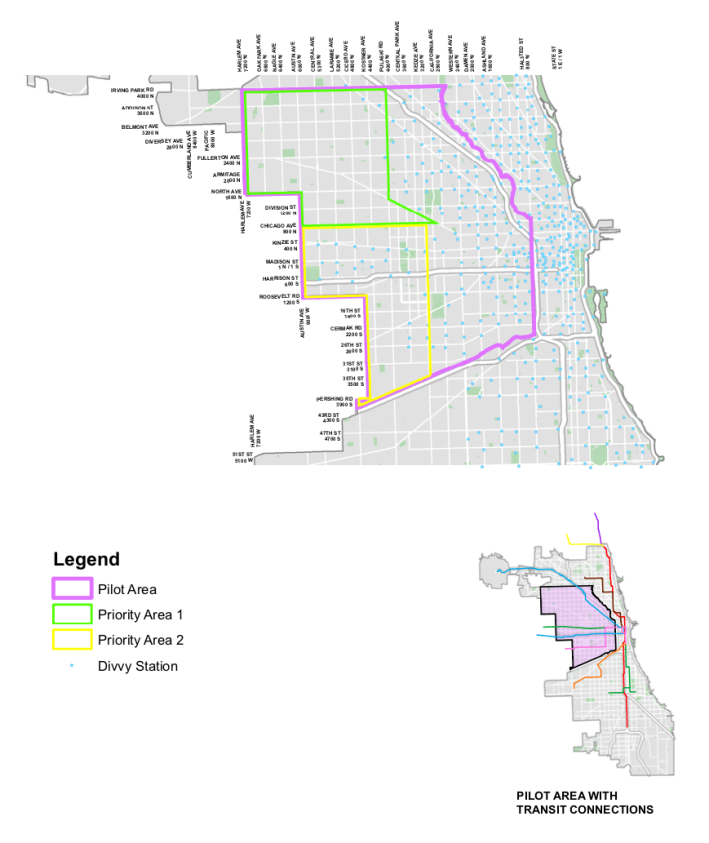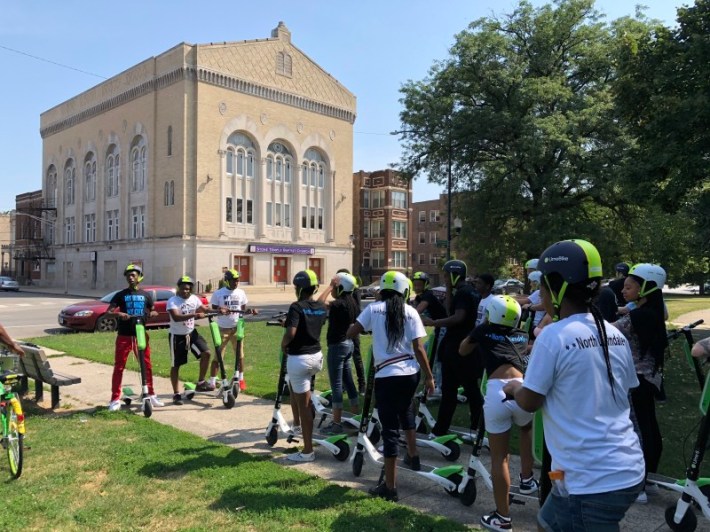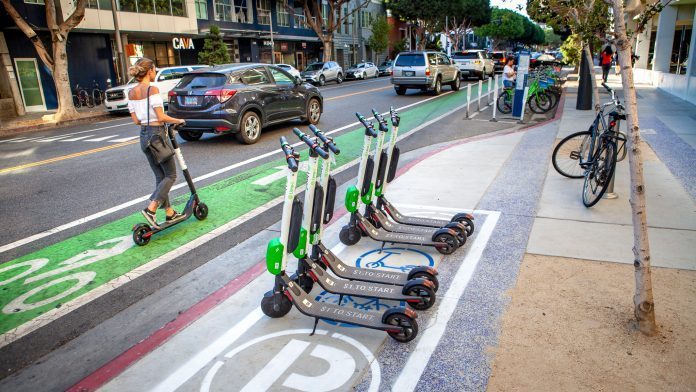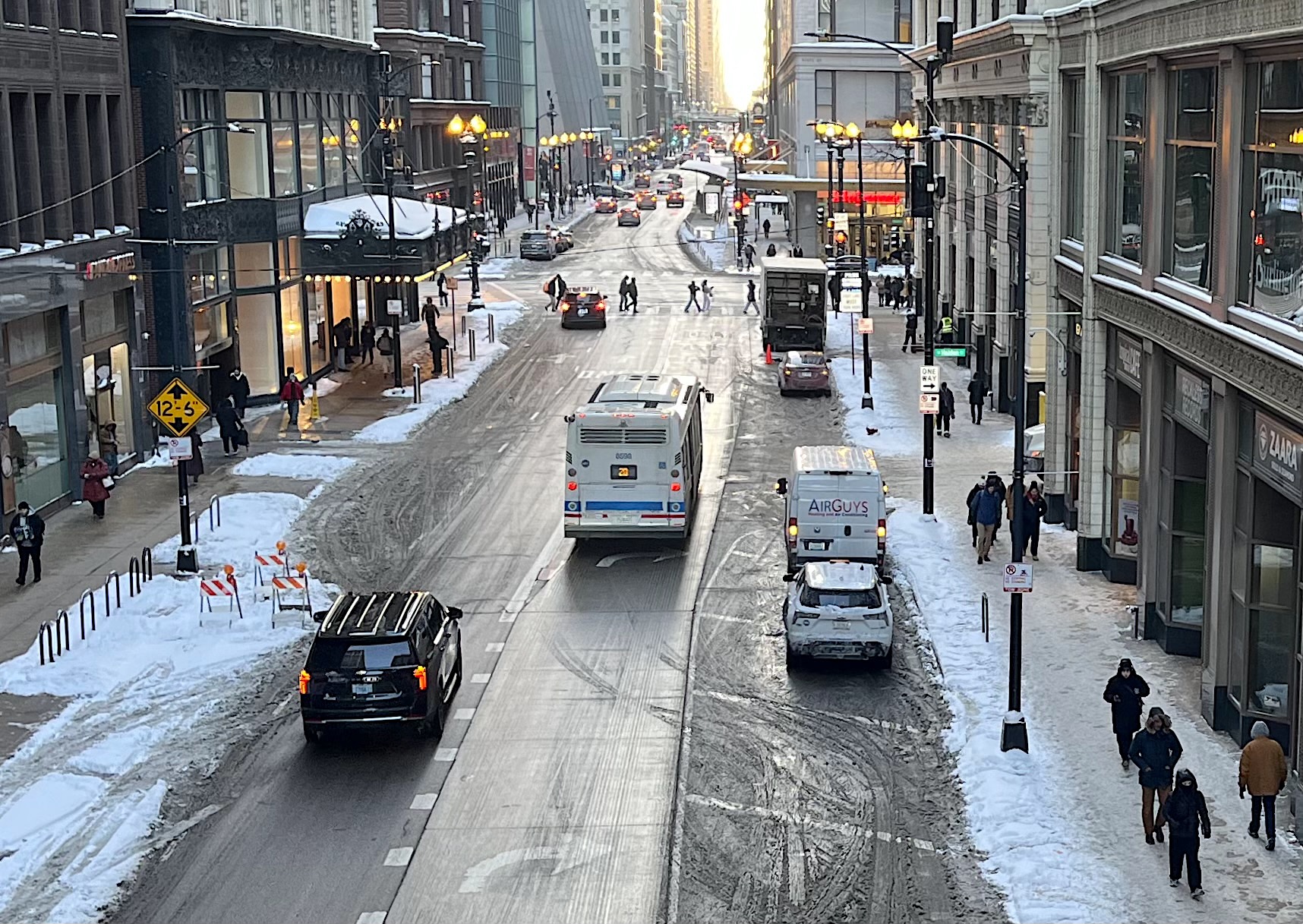Dockless electric scooters: Love 'em or hate 'em, they're becoming increasingly common in American cities. Proponents say they offer a handy first- and last-mile connection to transit and replace driving for other kinds of short trips, basically serving as bicycles for people who aren't willing or able to risk getting sweaty during their commute. Opponents say they endanger pedestrians on sidewalks, clog bike lanes, create sidewalk clutter and vandalism eyesores, and encourage people to recreate without actually getting any exercise. Reflecting this backlash, a brewery in Austin, Texas, where the micromobility devices are said to be ubiquitous, even created a "No Scooters" beer.
Here at Streetsblog Chicago we've been badgering the Chicago Department of Transportation for months to get info on plans to allow dockless scooter (DSco, pronounced "Disco") operators to set up shop here. Today the city announced that they're taking a similar approach as last year's dockless bike-share pilot, quarantining the technology to a particular section of town. The six-month dockless bike test included virtually all of the city south of 79th Street, which had almost no Divvy stations. The scooter pilot will be largely limited to the West and Northwest sides.
CDOT and the Department of Business Affairs and Consumer Protection made a joint announcement today that applications are open for vendors to participate in the pilot, citing recommendations by the city's new Transportation and Mobility Task Force that such a test be conducted. The program will launch on June 15 and will last four months, through October 15. Since the application process just opened today, we yet don't know which vendors will participate, but Lime (which did demos in Chicago last year), Bird, Lyft (which runs Divvy), and Uber/JUMP are likely candidates.
“The City is committed to improving transportation access, reducing single-occupancy vehicle use, and providing first- and last-mile solutions to support public transit,” CDOT Commissioner Rebekah Scheinfeld said in a statement. “This program is designed to test how scooters as a mobility option can support these goals and to evaluate the impact of the technology on Chicagoans.”
The city stated that it will be legal to park a scooter wherever it is legal to lock a bike in the public way. According to Chicago's bike parking ordinance, that would be "against the curb or upon the sidewalk, against a rack, parking meter or sign pole to support the bicycle, or against a building or at the curb in such manner as to afford the least obstruction to pedestrian traffic." (Fun fact: I helped get the ordinance revised to include parking meters and sign poles back when I was CDOT's bike parking manager back in the early 2000s.) However, that's not actually completely true -- more on that in a minute.
Riders will typically use a smartphone to unlock and ride the devices within the pilot area, though vendors will offer services for non-smartphone users and cash-based options. The pilot zone, located on the west side of the city, will be bounded by Halsted Street and the Chicago River on the east, Irving Park Rd. on the north, the city boundary and Harlem Avenue on the west, and the Chicago River on the south. Two priority areas have been identified within the pilot zone, where at least 25 percent of scooters must be placed every morning.

“This geography, and particularly the priority areas, were selected for the opportunity to pilot scooters in a variety of community types,” said BACP Commissioner Rosa Escareno in a statement. “We want to support innovation and new emerging industries- this pilot program will allow the City and its residents to better understand how electric shared scooters impact the city. We have engaged with advocates, community groups, business groups, and elected officials within the pilot area and look forward to working closely with residents to evaluate the program.”
The pilot area also means that the scooters won't be available for commutes to and from downtown rail stations and workplaces, and we probably won't be seeing them in large number on the Lakefront Trail (which is probably a good thing.) "There was too much potential for sidewalk clutter downtown," a city official told me.
The scooter program is made possible through an Emerging Business Permit issued by BACP and will include a total of 2,500 scooters minimum, 3,500 maximum, in the pilot area, divided evenly among all selected vendors, the city says. To minimize sidewalk clutter, scooters must be parked upright; away from street corners, bus stops, and buildings (which actually isn't in line with the bike parking ordinance); and with a minimum six-foot clearance on the sidewalk. Vendors will be required to retrieve and move improperly parked electric shared scooters within two hours.
The city says that to ensure a safe riding environment, scooters will be prohibited from operating on the sidewalks and will be limited to a maximum speed of 15 miles per hour. The scooters also will be equipped with a warning bell, front and rear lights, hand and foot brakes, and a 24/7 phone number for each vendor.
Unlike some scooter cities, like Portland, Oregon, there is no helmet requirement, which is a good thing, since a helmet rule would be a barrier to use. It will also prevent police from using the rule as a pretext to stop and search residents in communities of color, something that the Chicago Police Department has admitted to doing with bike law enforcement.

In a key difference from Chicago's dockless bike pilot, operating hours for the scooter program will be from 5 a.m. to 10 p.m. only, with the scooters removed from the public way every night by the vendors. This curfew was likely designed to minimize theft and vandalism, and DSco operators will need to take scooters off the street regularly to recharge them anyway. On the other hand, forcing the companies to pick up and drop off the scooters every single day will result in a lot of additional driving, which is counterproductive to the purpose of the program.
Scooter operators will be required to provide the city with realtime and continuous data on operations, ridership, and safety, to ensure that the city is able to effectively manage the pilot and determine next steps.
The city says that to understand the impact of scooters and prepare for this pilot program, BACP and CDOT have led a series of focus groups and listening sessions with community groups, advocates for individuals with disabilities, and local transportation stakeholders. Based on their feedback, the city says, this pilot has been designed to test the potential of scooters as an inclusive and equitable mobility option for Chicago residents. The departments promise to continue to engage with stakeholders during the rollout and duration of the pilot to gain their feedback and evaluate the effectiveness of the program.
“Scooters can potentially provide an affordable, environmentally-friendly transportation solution for thousands of Chicagoans,” said Sharon Feigon, executive director of the Shared Use Mobility Center. “We are very excited to test the impact of this new mobility option in Chicago through the scooter pilot program.”
Active Transportation Alliance director Ron Burke expressed more of a wait-and-see attitude towards the pilot. "Chicago needs more and better alternatives to driving, and electric scooters can be part of a growing list of more efficient transportation options," he said in a statement, but added that "It will be important to prevent people from riding or parking scooters inappropriately on the sidewalk, or filling up the city’s already limited network of comfortable bike lanes. In addition, the safety and mobility needs of people with disabilities must also be closely watched and evaluated throughout the pilot."
Burke added that Active Trans has encouraged the city to work with companies and businesses to create designated parking corrals and incentivize proper parking, especially in congested areas like Randolph Street in the West Loop and Milwaukee Avenue through Wicker Park. "In addition, we have urged the city to repurpose parking and travel lanes to bike/scooter lanes in the pilot’s areas busiest corridors to help limit sidewalk riding and encourage efficient travel."
Burke argued that the scooter pilot has the potential to be a win for all sustainable transportation users. "For decades cities have designed streets around cars and other modes have largely been ignored – resulting in more dangerous streets for everyone. More Chicagoans riding scooters can help us win street space back from cars carrying one or two people, and get more people walking, biking, and riding public transit."
Visit the CDOT website for more information about the scooter pilot.





